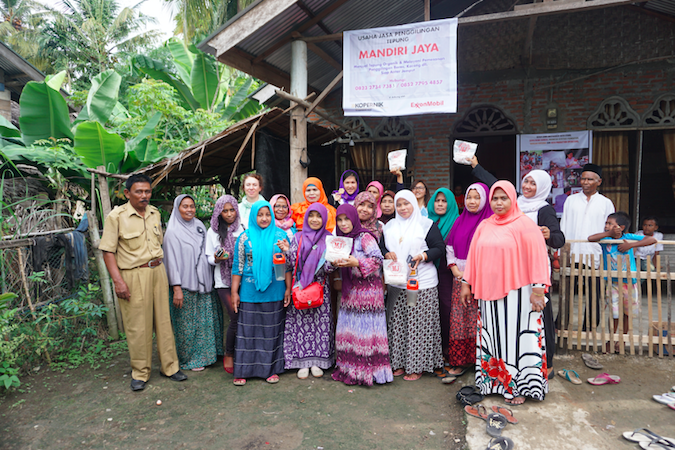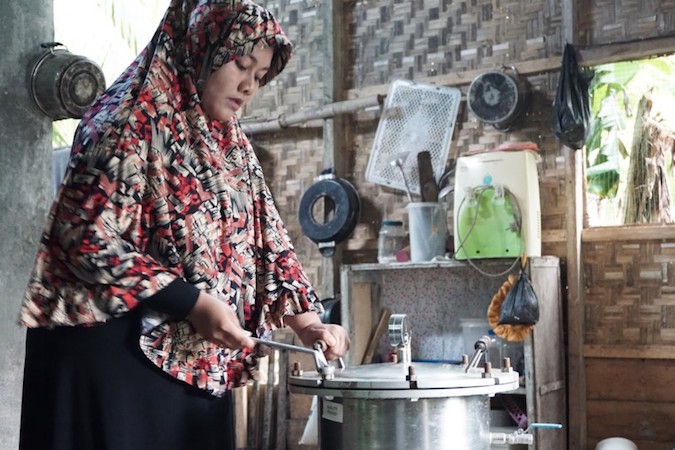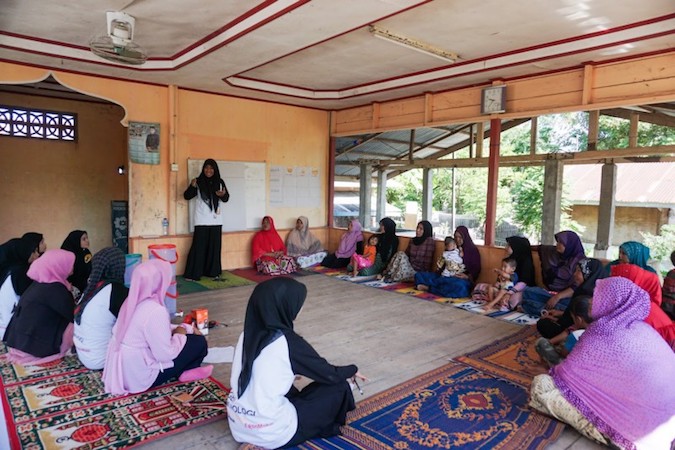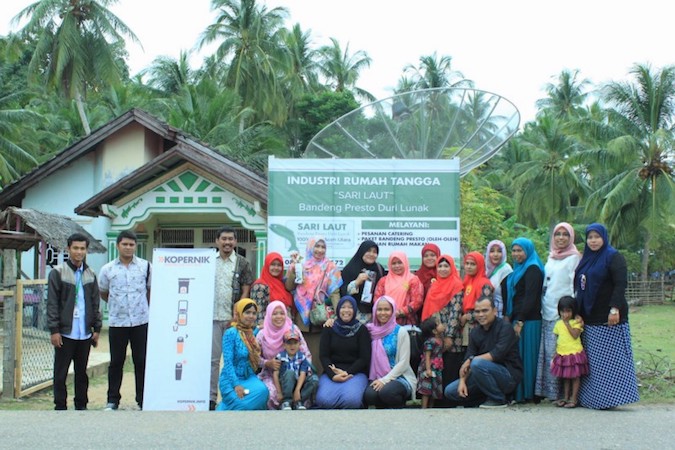This year marks the fourth year since Kopernik launched the Wonder Women program in North Aceh. The program, initially managed by a team of two, has grown in size and scale, now with five highly dedicated and professional staff members. The Wonder Women North Aceh program was designed as a women’s economic empowerment program that recruited and trained women to become micro-social entrepreneurs, selling solar lights, water filters and other clean energy technologies within their communities. This boosted their income while supporting the reach of clean energy technology throughout the region.
Most of the entrepreneurs, or as we call them ‘wonder women’, are early childhood teachers who earn a nominal teaching income of between Rp 50,000 — Rp 100,000 (US$4 — US$8) per month — a very small amount. Many joined the program in groups with the motivation to increase their income. As part of the program they received training on technology use and maintenance, sales and marketing, bookkeeping, and public speaking which has helped to enhance their personal and entrepreneurial development. The margin they earned selling the technologies was managed by the group and used like a savings and loans scheme for group members. At the end of 2016, the North Aceh program team was successfully managing 11 groups with 87 wonder women in total.
 The flour-milling business called Mandiri Jaya was officially opened for business in May 2015. Mandiri Jaya means independent and prosperous, a perfect name to reflect the women’s business aspirations.
The flour-milling business called Mandiri Jaya was officially opened for business in May 2015. Mandiri Jaya means independent and prosperous, a perfect name to reflect the women’s business aspirations.
As time went by and their market became increasingly saturated, the Aceh team searched for more opportunities for the women to develop sustainable sources of income. In 2015, the program started offering group business support to the wonder women. They conducted needs assessments for 22 potential businesses and subsequently established two group businesses: a flour-milling enterprise and pressure-cooked milkfish business. In the process of establishing these group businesses, the program team not only gave support to facilitate the development of new business processes, but also to obtain appropriate technologies needed for production.
 The pressure-cooked milkfish business called Sari Laut was established in August 2016. The high availability of milkfish in the area and its potential market were the main reasons to choose this business.
The pressure-cooked milkfish business called Sari Laut was established in August 2016. The high availability of milkfish in the area and its potential market were the main reasons to choose this business.
The North Aceh team also assisted the wonder women in the region with entrepreneurial training. In 2016, they focused on further enhancing the skills of wonder women to become peer facilitators for other women. The team piloted the peer facilitator initiative, with 11 wonder women passing the Training of Trainer (ToT) module. Facilitator Wonder Women then prepared and delivered basic entrepreneurial training to other wonder women and helped to conduct Tech Fairs — technology demonstrations to potential consumers — which improved access to simple life changing technologies for some of the poorest communities in North Aceh. The peer facilitator initiative enabled the wonder women to engage further with the program but also to work more independently on creating social change in their communities.

However, while the program team were working with women to distribution clean energy technologies and establish new businesses, they could see the huge potential for other renewable energy solutions that extended beyond household technologies. Additionally, considering the strength and maturity of the Wonder Women program, the idea to create an independent organisation that serviced the specific renewable energy needs of the region was born. So, at the end of 2016 Kopernik’s Wonder Women North Aceh Program team became Rumbia, which stands for Rumah Usaha Bina Mandiri Indonesia and loosely translates to Indonesia’s Independent Entrepreneurship Hub. They officially launched the organization in early March 2017, introducing it as the first organization in the Aceh province to focus solely on community empowerment through access to renewable energy. A core focus of Rumbia is to continue the Wonder Women program, supporting business development in the community and improving access to household clean energy technologies.

Considering the frequent electricity blackouts in Aceh, one of the key programs that Rumbia will implement is DESARE, which stands for Desa Ramah Energi or Energy-Friendly Villages in English. In addition to simple clean energy technology distribution, the DESARE program also aims to provide improved access to electricity generated from renewable energy technology. They believe that renewable energy is one of the strongest solutions for rural communities who live off the grid. Rumbia’s efforts are also focused on improving the welfare of rural communities. Having access to more reliable electricity will place people in a better position to investigate new economic opportunities, to continue to be productive after sunset, and to improve education opportunity for children who can use lighting to study at night. It is planned for this program to be implemented in three villages that are amongst the top five most remote villages in the Aceh province.
By implementing this program, Rumbia will support the achievement of the Sustainable Development Goals; particularly Goal 7 to ensure access to affordable, reliable, sustainable and modern energy for all; Goal 8 to promote inclusive and sustainable economic growth, employment and decent work for all; and Goal 1 to end poverty in all its forms everywhere as the long-term vision.
Rumbia is the first independent organization formed from within the Kopernik group. Now, as a sister organization to Kopernik, the two entities will partner on new projects and other initiatives in the future. With greater autonomy and flexibility, Rumbia will harness the skills and resources of the North Aceh community to deliver suitable solutions to the energy access issues of the region.


